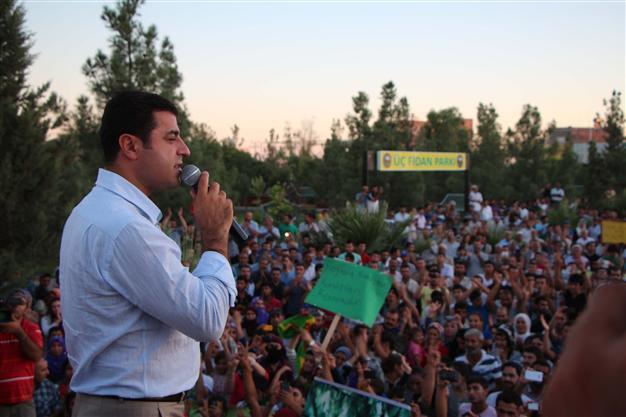Ruling AKP, BDP in row over Kurdish peace bid
ANKARA - Hürriyet Daily News

BDP’s co-chair Selahattin Demirtaş says the government should make its emocratization package public on Sept 1, and legislate it before Oct 15. DHA photo
An already delicate process to resolve the decades-old Kurdish question is becoming more troubled by the day, with counter-statements from the government and the Kurdish political figures now accusing each other of not fulfilling promises given.While the government is criticizing the outlawed Kurdistan Workers’ Party (PKK) for prolonging the withdrawal of its militants into northern Iraq, the Peace and Democracy Party (BDP) is firing back against the government over its reluctance to announce the democratization package. BDP’s co-chairperson Selahattin Demirtaş’s statement that the government should make its package public on Sept. 1, and legislate it before Oct. 15, caused a fresh rift between the two.
“There are steps to be taken, we will take these. ‘Take it until this date.’ We have not taken these steps because the terrorist organization or the BDP wanted them, and we will not after this point,” deputy leader of the Justice and Development Party (AKP) Mehmet Ali Şahin said in an interview with the Anadolu Agency on Aug. 18.
Şahin chose to speak vaguely of the contents and the timing of the package. “As far as I have learned, it is presented to Mr. Prime Minister. Maybe it comes up on the agenda of the Central Executive Board [MYK] meeting to be held next Monday, maybe our related friends and our Mr. Prime Minister will inform us at the MYK. Since I am not a part of that commission, I have no information on the contents,” Şahin reiterated.
Şahin also repeated Prime Minister Recep Tayyip Erdoğan’s previous statement about how the first phase, the withdrawal of the armed forces of the PKK, has not been completed.
“The promises on leaving Turkey have not been fulfilled. In a very simple sense, it is such that 20 percent, and these are children, old women and such. Apart from this, ‘withdrawal’ is not the case,” Erdoğan has said, as daily Hürriyet reported on Aug. 17. A day after Demirtaş’s remarks, BDP deputies have once again visited Abdullah Öcalan, the imprisoned leader of the outlawed Kurdistan Workers’ Party (PKK) on August 17, and delivered his message where he affirmed that the negotiations continued.
“Meetings and negotiations we have with the state delegations continue. Until this stage, I gave meaning to my position to be valued as an instrument, but from now on, my position must evolve from being instrumental into a more strategic position,” Öcalan was reported as saying.
“I think that for the process to proceed healthily, the government too must take practical steps on democratization with democratization packages which will be prepared through a participatory method,” Öcalan added.
CHP questions peace process
In the meanwhile, the deputy group chair of the main opposition Republican People’s Party (CHP), Muharrem İnce has held a press conference in his party’s provincial organization in Ordu, where he posed ten questions on the peace process.
İnce’s questions included the position of Öcalan in the peace process, the status of the PKK, and why a laying down of arms is not included in withdrawal among others.
“Why is the solution reduced solely to Abdullah Öcalan? Does this 30-year-long trouble of Turkey only concern Abdullah Öcalan? His amnesty, his house arrest, health, ideas? Is this process only about the future of Öcalan?” and “Is the PKK included in the Syrian process knowingly?” were among the most notable of İnce’s questions.
İnce also argued that the AKP would not introduce a general amnesty which would cover Öcalan, but instead they would make amendments to the Law on Execution. “This is how they deceive the nation. If they say ‘general amnesty,’ those who are freed will be able to talk. Those who are arrested today too will be able to talk without fear. But when they amend the Law on Execution, even if they are freed, they will be afraid that they can be arrested again.”
















